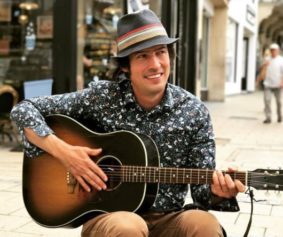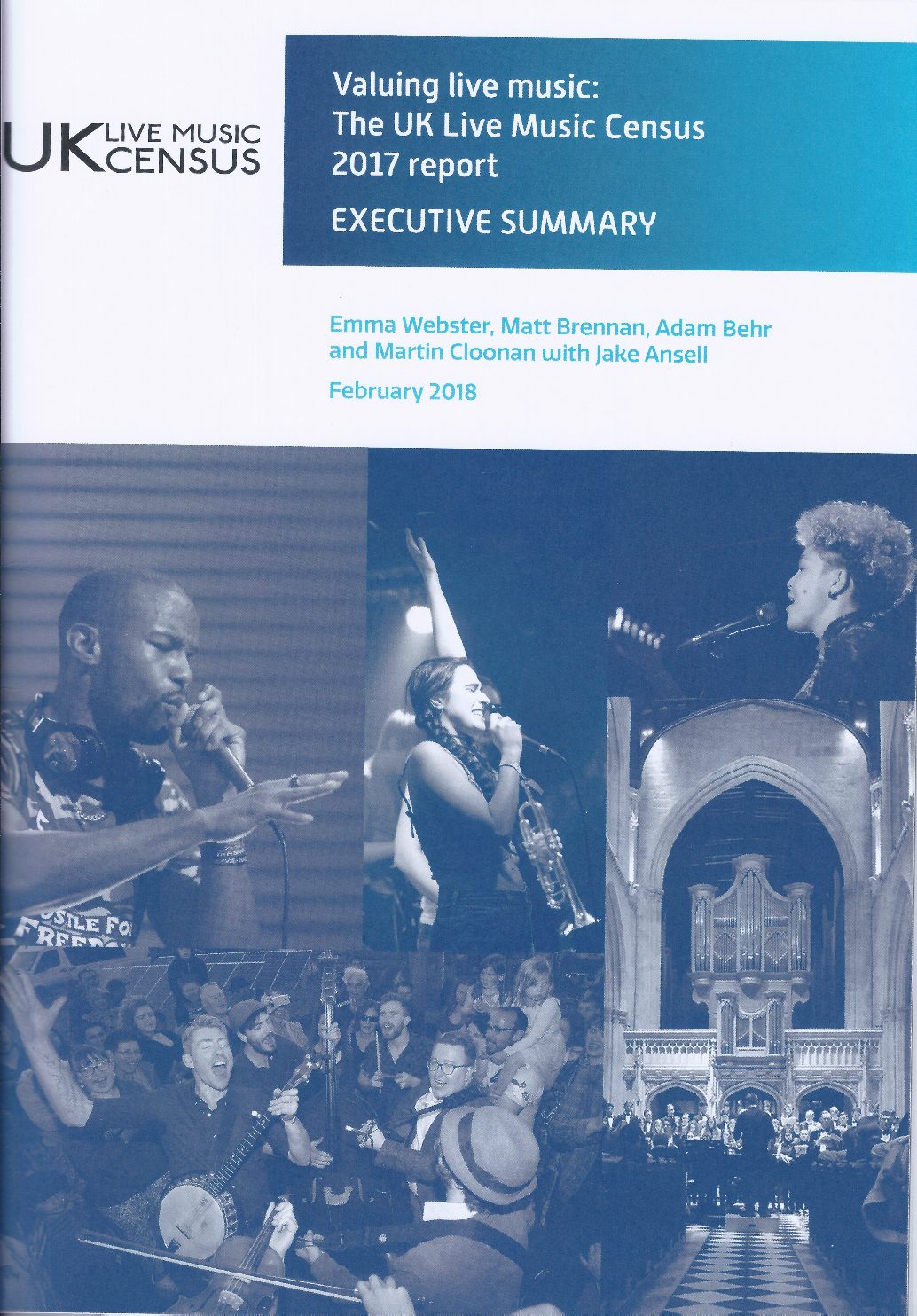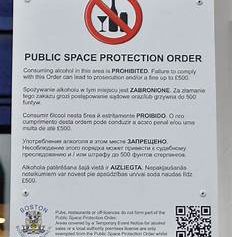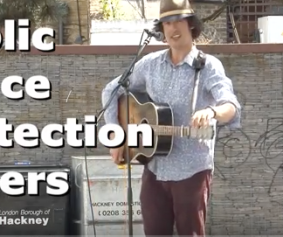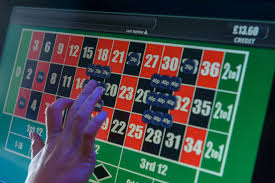A heartfelt celebration of the Life of Jonny Walker Campaigner Extraordinaire
At a wonderful jam packed service in Leeds Minister we celebrated the life and personality of Jonny Walker. This was my tribute.
Jonny was a man with a mission.
With his Keep Streets Live Campaign he was one the most determined, articulate and effective campaigners for a cause I have ever encountered. I first met him at a meeting of the London Busking Taskforce set up by the London Mayor’s Office to ensure that voluntary solutions to any busking issues were found rather than resorting to heavy handed bureaucracy.
Ironically as we met in City Hall a band of young musicians was being arrested for busking in Leicester Square.
I then hosted another meeting of the group at the House of Lords. Our work resulted in the launch of Busk in London and a new voluntary code of busking conduct across the city.
We were all veterans in one way or another of live music campaigns but Jonny was exceptional. Jonny was a active busker the length and breadth of the country and had experienced for himself the attempts by local authorities to restrict what they saw as a social nuisance but which he and we saw as an attempt to stifle street musicians and freedom of expression.
He had already shown how voluntary agreements on busking could work and had persuaded Liverpool and York councils to adopt a voluntary code of practice.
As a demonstration of his dislike for compulsory restrictions he took Camden Council to court for adopting an onerous busking licensing scheme under the London Local Authorities Act.
"What made Jonny so special was his mischievous sense of humour allied to his deep understanding of the legal issues involved."
— Tim Clement-Jones
What made Jonny so special was his mischievous sense of humour allied to his deep understanding of the legal issues involved.
A great example was when he and fellow buskers launched “The Church of the Holy Kazoo” religious group in Camden because the licensing scheme introduced by the Council didn’t apply to religious groups who wanted to perform. So Jonny and his colleagues created a new religious group to get round the restrictions and illustrate the futility of this new licensing regime.
In the same vein he was a great exponent of using YouTube to embarrass officials over using unjustified powers. Many of us saw his Romford Youtube video and were shocked by how far we had come in limiting freedom of expression in British towns.
He will be mourned in Leeds and Norwich too where he was active. But his influence went much wider . He highlighted busking issues in Newcastle, Bournemouth, Doncaster, Havering, Ha Indy, Canterbury, Swindon, Birmingham, Oxford, Chester Exeter, Gravesham and Bath all the time campaigning against restrictions, some petty, some major, all designed to erode traditional freedoms through instruments such the new Public Space Protection Orders.
At the end of last year we heard that because of the efforts of Jonny and our campaign we have succeeded in changing official guidance to ensure that it is much more difficult to ban busking through these orders.
In their obituaries, so many of our local newspapers saw him as part of their local culture. They claimed him as their own. Every major city and town across the country will miss him. Who will fight the bureaucrats and push back against the gradgrinds now?
Jonny was a bright light, infectiously enthusiastic and extremely likeable. He will be missed by his loyal fans across the country. He will be missed by his fellow campaigners. With an eclectic collection of headgear on head, guitar in hand and maybe with kazoo in mouth, Jonny we will miss you sorely.
Lord C-J helps launch the 2017 Live Music Census Report
I recently helped to launch the excellent Report on the 2017 Live Music Census carried out by Emma Webster Mat Brennan, Adam Behr, Martin Cloonan and Jake Ansell at the Musicians union HQ in Clapham Road. I was asked to give an overview of Parliamentary progress in supporting grassroots music venues. This is what I said:
First of all many congratulations to Emma , Matt, Adam, Martin and Jake for a really impressive high quality report. In this company I can say they make a virtuoso quintet!
It will really underpin and validate the case that so many of us are making inside and outside Parliament about the importance of live music and the closures and potential threats to grassroots music venues, which are such an important part of our music scene both for audiences and musicians.
Just a couple of weeks ago, many of you will remember, there was a very impressive turnout by peers and MP’s in support of John Spellar’s Agent of Change Bill outside Parliament .
The sheer support for the Bill and the far greater interest by Parliamentarians in the welfare of Grassroots Music Venues will be reinforced by the research carried out by the authors of this UK Live Music Census but is also testimony to the concerted activities over the past few years of campaigners such as UK Music, the Music Venues Trust and the MU and many in this room. We are now creating a much bigger campaigning community for music in Parliament.
Parliamentarians are now much more alive to the fact-as shown in today’s report-that there has been in recent years a perfect storm of circumstances for the night-time economy, resulting in a continuing decline in grassroots live music venue and they realize that once gone, these venues will not come back into our towns and cities.
The report itself highlights rising rents and business rates, planning and property development issues, and noise related complaints as the key contributing factors.
There have however been some individual bright spots as result of these issues being raised by campaigners. The campaign for Agent of Change is a case in point.
As a result of a campaign in a previous Housing and Planning bill, Agent of Change principles were made to expressly cover conversions but did not cover new build.
After the introduction of John Spellar’s new Bill which expressly provides for this, Sajid Javid has agreed to include the principle “in detail” in the National Planning policy Framework which will make housing developers building new homes near UK venues responsible for addressing noise issues and this should help protect venues from any new build development in their nearby vicinity.
Also there seems to be some daylight on business rates reform in terms of an indexation switch to CPI, . A discount for pubs is welcome but relief needs to be extended explicitly to grass roots venues as a whole. The London Mayor’s Economic Development strategy recognizes the issue for the London’s night time economy and is pressing the Valuation Office Agency to review its valuation policy, which would be a step in the right direction. But all this needs to happen quickly and it needs to be nationwide.
"We are now creating a much bigger campaigning community for music in Parliament."
— Lord Clement-Jones
Then there is the whole question of secondary ticketing.
In the last couple of years the campaign to stop the rip off against fans by the All Party Parliamentary Ticketing Abuse Group, groups like FanFair Alliance, trade bodies like UK Music and the MMA has by and large achieved a great deal. First of all amendments to the information requirements on ticket resellers through the Consumer Rights Act and then last year in the Digital Economy Act with the outlawing of bots buying up tickets on an industrial basis.
New guidance under the Consumer Rights Act makes it absolutely clear what information must be provided by secondary sellers and provide better protection for audiences, artists and event organisers.
The next step was to make sure that these laws are being obeyed. Having looked at this as a result of debates on the Consumer Rights Bill, the CMA last November reported that it is now taking enforcement action against some of the offending Secondary sellers, and enquiring further into their practices.
At the end of the day however, welcome though all these developments, there is more to be done. And urgently too. Venues are still closing. We need a comprehensive approach to the protection of these venues. That is why I welcome the new enquiry into Live Music being undertaken by the DCMS Select Committee
Specifically as part of that they will be asking : “How the music sector been affected by the closures of small music venues across the country,? Should small music venues be classified as cultural venues? What initiatives can be put in place to help grassroots artists and bands?”
This report will be hugely helpful in setting the scene for the Select Committee.
We need to look at ideas such as a Culture & Heritage Investment Tax relief as Music Venue Trust suggest in their evidence and imaginative schemes such as their Sound+Vision plan.
I hope UK Music will return to the idea of an amendment to the Licensing Act which would create a fifth licensing objective that would oblige licensing authorities to consider the wider benefits of music and entertainment in the community when carrying out their functions. As is stands, the cultural contribution of a grassroots music venue is not considered at all.
Having this fifth objective might just be the critical edge to a decision that will either lead to a venue closing or to it remaining open.
I don’t often quote Ed Vaizey but I thoroughly agree with what he said 2 years ago at Venues Day: “ A vibrant music venue which is breaking new acts has just as much right to be considered a cultural venue as a local or regional theatre”
So we need to make sure that Arts Council England treats Grassroots music -as they do on the continent- as an essential part of our cultural scene. It seems completely weird that the British Council do when our artists tour foreign venues but the Arts Council don’t recognize this.
We mustn’t build our expectations too much but the Select Committee has a good track record and it could produce an important platform for a new set of campaigns.
Enough from me . I was only meant to do a few riffs, so I’d better get off the stage!
Dozens of Public Space Protection Orders now illegal under new Government guidance
Just before Christmas without any publicity at all the Home Office published new Statutory Guidance governing Public Spaces Protection Orders (PSPOs), a power that has been used to ban a wide range of public activities, including ball games, rough sleeping, busking, skate boarding and standing in groups.
The Manifesto Club without whom I worked on this campaign to change the guidance carried out FOI surveys into the use of the PSPO power in the period up until June 2017 (using this data, they estimate that around a fifth of existing PSPOs are explicitly prohibited, or strongly advised against, by the new guidance.
But because of the lack of publicity, as they say in their most recent posting Councils such as Runnymede Borough Council, Ealing Council and Elmbridge Borough Council are are continuing to pass and enforce unreasonable PSPOs.
Read what the Manifesto Group say about the changes.
The important change is that the new Statutory Guidance makes clear that orders should only target the specific behaviour that is causing nuisance or harm, rather than activities that are in themselves harmless (see our analysis of the Guidance changes).
The Guidance states that ‘councils should ensure that the Order is appropriately worded so that it targets the specific behaviour or activity that is causing nuisance or harm and thereby having a detrimental impact on others’ quality of life’.
It also states that PSPOs ‘should not be used to target people based solely on the fact that someone is homeless or rough sleeping’, and that they should not target ‘everyday sociability, such as standing in groups which is not in itself a problem behaviour’.
The Guidance strongly advises against the banning of activities for young people, such as skateboarding, stating: ‘It is important that public spaces are available for the use and enjoyment of a broad spectrum of the public, and that people of all ages are free to gather, talk and play games.’
Our surveys of PSPOs found that, up until June 2017, there had been 319 PSPOs issued by 152 local authorities. Of these, we judge that 64 PSPOs, or a fifth of all orders, either openly violate or strongly go against the terms of the new Statutory Guidance.
This means that dozens of councils have passed orders which violate the new guidance, since they target behaviours that are essentially innocuous.
These include:
- 30 bans on loitering or congregating in groups: the guidance explicitly states that standing in groups ‘is not a problem behaviour’;
- 14 PSPOs introducing dispersal powers (allowing council officers to disperse people from an area): this fails to target a ‘specific behaviour or activity’;
- 3 bans on the wearing of face or head coverings: this activity does not in itself cause nuisance or harm;
- 7 bans on rough sleeping or sleeping in public: the guidance states that rough sleeping itself should not be targeted;
- 7 restrictions on everyday activities in public spaces that are so broad as to be unjustifiable for the aim of preventing detrimental behaviour;
- 3 orders targeting the activities of homeless people, where their behaviour is not actually causing nuisance or harm”
The Guidance strongly advises against the banning of activities for young people, such as skateboarding.
Lord C-J calls for restriction on PSPO's
Back in the Summer buskers, civil liberty campaigners and many others protested about the increasing use of PSPO's a subject on which I have been campaigning ever since the Anti Social Crime and policing Bill became law.
See here
https://youtu.be/hI4oGE9JxSk
Recently I held a debate in the House of Lords to highlight the growing problem and the many examples where these powers had been used inappropriately and without proper authority or accountability. Our aim is to get the Government at the very least to change the guidance given to Local Authorities (the "Statutory Guidance") to make sure the powers are properly exercised and if that is enough to amend the original Act.
My Lords, I have for many years been passionate about the future of live music and am only too well aware that many of our most famous acts can have small beginnings, with many well-known artists starting their careers performing in small clubs and pubs or busking on the streets. It was for that reason that I promoted the Live Music Act 2012 and why, on my Benches, we became concerned about the impact of public space protection order powers under the Anti-social Behaviour, Crime and Policing Act 2014.
In response to concerns expressed by my noble friend Lady Hamwee on Report, the noble Lord, Lord Taylor of Holbeach, confirmed the importance of the statutory guidance, which would be consulted on. Ominously, he said that the essence was to allow councils maximum flexibility on the exercise of the new powers. That, I believe, is the root cause of the problem today.
Shortly afterwards, in January, I raised a Question in the House seeking further assurance on busking policy to make sure that local authorities would not resort to a PSPO before they had first exercised their noise-abatement powers. The noble Lord, Lord Taylor, said:
“The Government are certainly not seeking to restrict reasonable behaviour and activity, and we do not believe that these powers do. Live music and street entertainment play an important role in community life and can generate a positive atmosphere that is enjoyed by all”.
He also said:
“We believe that the tests and safeguards set out in the new anti-social behaviour powers will ensure that they will be used only where reasonable”.—[Official Report, 21/1/14; col. 571.]
In June of the same year, I raised issues regarding police attitudes to busking and received an equally positive reply from the noble Baroness, Lady Williams of Trafford, who I am delighted is replying to this debate. She said that,
“the Government are clear that appropriate busking can enrich a community’s quality of life and generate a positive atmosphere that can be enjoyed by many people”.
She also said that,
“we have undertaken … to include reference to busking in the guidance for the new anti-social behaviour powers for use by the police and others. This will be published shortly, in advance of the new powers commencing later in the year”.—[Official Report, 30/6/14; cols. 1531-32.]
Later in the year, in a different context, during the passage of the Deregulation Bill, both in Grand Committee and on Report, my noble friend Lord Stoneham and I pointed out the considerable powers that were already available to prevent noise nuisance. At the same time, we raised our continuing concern that public space protection orders would be used in a heavy-handed way. The Government, this time in the form of the noble Lord, Lord Gardiner of Kimble, gave assurances on both occasions that they were clear that busking can enrich a community’s quality of life and generate a positive atmosphere enjoyed by many people. But later he said:
“The Government do not start from the position that busking requires regulation and control”.—[Official Report, 11/11/14; col. GC 46.]
So right from the start we received a series of ministerial assurances about how the new PSPO would be exercised. Nevertheless, very soon, signs began to emerge of inappropriate use of the PSPO powers.
In February 2015, I asked an Oral Question about the operation of the Act and what use had been made of it to prevent or control busking. In reply, the noble Baroness, Lady Williams, said:
“We have made it clear in the statutory guidance for front-line professionals that they should not use the new powers to stop reasonable activities such as busking or other forms of street entertainment that are not causing anti-social behaviour”.—[Official Report, 12/2/15; col. 1354.]
Despite those ministerial assurances, it was becoming clear a year and a half ago that these powers were being used extensively in an inappropriate and disproportionate way. In fact, they were not just being used inappropriately to ban busking, they were being invoked for much wider purposes—for instance, to ban the homeless from the streets. In February this year, the Manifesto Club published its report, PSPOs: A Busybodies’ Charter, reflecting this, pointing out the extensive and disproportionate use of these powers and calling for proper limits to be placed on them.
In response to an Oral Question this February, I received yet more assurances from yet another Minister, this time the noble Lord, Lord Ahmad of Wimbledon. He said that,
“we have made it clear in the statutory guidance that anti-social behaviour powers should not be used against reasonable activities such as busking, where this does not cross the line into anti-social behaviour”.—[Official Report, 1/2/16; col. 1585.]
Despite a succession of assurances given over the years by at least four government Ministers, the problem of the inappropriate use of PSPOs worsens. Buskers are now falling foul of laws designed to break up dangerous public gatherings and risk being branded as criminals. The problem goes much wider. The Manifesto Club report shows that PSPOs are being used not only to criminalise busking but also the everyday lives of ordinary people, including the activities of the homeless, charity collectors, teenagers, skateboarders, parents dropping off kids at school and even those wearing head coverings.
Sefton Council’s ban on head coverings would include hats. Other councils, such as North East Derbyshire, have prohibited or are seeking to prohibit the carrying of golf bags, or the carrying of skateboards, as in Colchester. At least five have banned rough sleeping. Others, such as Gravesham Council, have prohibited lying down in public, which would prohibit lying on the grass or falling asleep in a public place.
At least six councils have banned or restricted music or street art. Hammersmith and Fulham Council has banned busking and public speaking in the area outside Shepherd’s Bush Tube station after 6 pm. At least 16 have created new criminal offences of loitering or congregating in groups in a public place. Hillingdon Council has prohibited people from gathering in groups of two or more unless at a designated bus stop, and Bassetlaw Council has banned young people aged 16 or under from standing in groups of three or more.
Kettering Council has banned skateboarding and created a curfew for under-18s, meaning it is now a crime for a 17 year-old to be out after 11 pm or before 6 am. In Oxford, the council has proposed a ban on any activity it judges makes people feel uncomfortable, and a city-centre PSPO has banned aggressive begging, street entertainment that causes a nuisance, remaining in a public toilet without reasonable excuse, and allowing dogs to enter any covered space. Hillingdon Council has banned noisy remote-controlled cars and pigeon feeding from its parks. Swindon Council has banned pavement art, thereby criminalising its resident and well-known pavement poet Danny Lake, even though 68% of the public voted against this.
So far, 80 councils have introduced PSPOs and more are threatening to bring them in. Police and local authorities, often based on the decision of a single official, and without consultation or a council decision, are throwing new orders about like confetti. A huge number of people are being dragged into the net of the criminal law. Clearly, the problem of improper use of these new powers extends well beyond busking: it is high time we took stock of this and amended the statutory guidance and, if necessary, the primary legislation, before our freedoms are eroded any further.
However, there may be a ray of sunshine. After my Oral Question last February, at the invitation of the noble Lord, Lord Ahmad, I, together with the Manifesto Club, the Kennel Club, Liberty, Keep Streets Live, the MU, UK Music, and others, wrote to him and his then Home Office colleague, Karen Bradley, to set out the current issues and demonstrate why changes are needed to the legislation and statutory guidance. Karen Bradley—now, I hope, in her new role stoutly upholding the rights of street performers and their contribution to local culture—wrote back defending PSPOs and the procedures used. She did, however, offer to consider amending the statutory guidance, and I replied in July, setting out what campaigners believe are the key problems and the changes needed to solve them. Let me spell these out.
First, PSPOs are targeting activities that are not in themselves harmful. The most problematic examples have banned activities that do not in themselves cause significant public nuisance or harm, such as rough sleeping, begging, loitering, standing in groups, swearing or skateboarding. We want to see a much stronger test before powers are used. PSPOs must target only activities that are causing significant public nuisance or harm; councils should not be able to use them for activities that some people just find annoying or unpleasant.
Secondly, the majority of PSPOs are being passed by single council officers. The Manifesto Club’s research found that out of the 56 councils that have passed a PSPO and provided data, half—that is 28 councils—have done this. Seventeen councils—30%—passed the order through a committee, but only nine—16%—passed it through a decision of the full council. They must be passed only after a debate of the full council and not based on decision of a single officer.
Thirdly, PSPOs are not being consulted on adequately. Although most councils have held a public consultation, in many cases these have been of extremely low quality. There must be a requirement for proper consultation, so that they cannot be imposed having asked just a few vague questions of residents.
Fourthly, the grounds and methods of appeal are too limited. We believe that the Government intended that these powers should be partly checked through the courts. There should be a much better right of appeal. Currently, appellants have very narrow grounds to appeal to the High Court, only six weeks to appeal and have to bear all the costs if they fail. The grounds of appeal should be expanded to something more like the test for judicial review, which would allow the worst cases of unreasonable PSPOs to be challenged and checked in the courts.
I am sure that we are here in the area of unintended consequences. Given Ministers’ assurances, I am sure that they did not intend the Act to be used in this way—banning rough sleeping, placing curfews on teenagers and so on. It is urgent and vital that they recognise that there is a fundamental problem with the Act. This may or may not be resolvable by changes to the guidance. I hope that we are making some progress and that amendments to the statutory guidance are being drafted as we speak but, in the light of the history of ministerial reassurances on this, I do not take anything for granted. I should like to hear specifically what is proposed.
Hence this debate about how the Government plan to ensure that these powers are invoked and exercised in an accountable, appropriate and proportionate manner: to find out whether demands for change, particularly to the statutory guidance, will be met. We cannot have local authorities and police services cracking down on our culture, ripping out the heart of our town centres and destroying the vibrancy of our local communities.
I have a note here from the Salvation Army. It states:
“Thank you for sponsoring a debate on the operation of the 2014 Act. We have had three of our front line locations raise concerns about the way in which Local Authorities are using Public Space Protection Orders in connection with homeless people spending time in public spaces … We would ask that government clarify their guidance to Local Authorities saying that PSPOs are not to be used to disperse homeless people rather than engage with them”.
I hope the Minister can today give cast-iron guarantees that the Government intend to make vital changes and will see them through.
Reduce FOBT stake to £2 says Lord C-J
Earlier this year I put forward a Private Members Bill in the Lords to reduce the FOBT maximum stake currently set at £100 to £2. This is the argument I made.
Through the Bill I am today pursuing a matter of considerable concern that has been raised in this House on a number of previous occasions by myself and my noble friends in particular, and which reflects great concern outside in the country.
Fixed-odds betting terminals—FOBTs—are touch-screen roulette machines in betting shops that allow the user to bet up to £100 every 20-second spin. They have transformed the betting sector since their introduction in 2001, and the Gambling Act 2005 classified FOBTs as B2s. The noble Baroness, Lady Jowell, stated at the time that if evidence of harm emerged, the £100 stake could be reduced as FOBTs were “on probation”. It is clear that the experiment to allow high-speed roulette in easily accessible betting shops has been a disaster and it is notable that as a result, the noble Baroness, Lady Jowell, herself recently called on the Government to act as the evidence of harm continues to build.
The essence of my Bill is to reduce the stake to £2 a spin. This is the maximum stake on gambling machines in all other easily accessible venues such as arcades and bingo halls. It will reduce gambling-related harm, prevent further betting shop clustering and restrict high-street money laundering.
The human misery caused is enormous. I will not rehearse all the harrowing stories, but many have been reported and they are extremely distressing. Clinical psychologist Anna Henry, who treats gambling addicts, said that FOBTs are designed to foster addiction:
“Basically the industry has created casinos in the High Street … These machines isolate the player, there is nothing to distract him from that screen. Its speed is to encourage frenzy. And thus more spending”.
More crime takes place in betting shops than in any other gambling venue. A freedom of information request to the Gambling Commission revealed 11,232 incidents in 8,980 betting shops from January to December 2014—an average of 1.25 incidents per premises, up from 0.82 the previous year. This compares to just 479 incidents related to the remaining 2,747 venues. These incidents account for 97% of police call-outs to all gambling venues.
The reality is that these machines are highly dangerous products which are a catalyst for problem gambling, social breakdown and serious crime in communities. Just take the case of a gambler in Leeds who was given a two-year sentence for attacking a betting shop worker
with a knife. The man had lost £1,000 playing FOBTs—money that was intended to be a deposit on a flat. He said that he was “utterly possessed” by the machines.
FOBTs are also useful to money launderers, as huge amounts of cash can be inserted into the terminals to legitimise the proceeds of crime. There were 633 suspicious activity reports in betting shops last year related to money laundering, but much of it goes unreported. A Gambling Commission report that will be considered by the Treasury said:
“The betting sector is regarded as high-risk relative to other gambling sectors. The customer base is varied, and often customers remain anonymous to the operator within the non-remote sector. The reporting and detection of suspicious transactions in the non-remote betting sector is often frustrated by the ability of a customer to remain anonymous”.
Bookmakers have a legal duty to comply with the licensing objectives of the Gambling Act 2005, but how can they comply and keep gambling crime-free and harm-free when the FOBT stakes are so high? Each betting shop is permitted four FOBTs, which now account for more than half of bookmakers’ profits. One has only to look at the importance of these machines in the recent figures for William Hill and Ladbrokes. The gross win on each machine is worth £1,000 a week. That led to a 43% increase in the number of betting shops on the high street between 2004 and 2012.
While planning authorities are in a better position to refuse applications, licensing authorities are still required to aim to permit betting shops. They are still powerless to stop the proliferation of betting shops and FOBTs on the high street. One street in the London Borough of Newham has 18 betting shops. As a result, 93 local authorities led by Newham Borough Council submitted a proposal under the Sustainable Communities Act. They called for the stake to be cut to £2 due to the anti-social behaviour, crime and problem gambling that the machines are causing in their local areas. This unprecedented step represents the widest support that any Sustainable Communities Act proposal has ever received. The Government rejected that proposal last year, but the Local Government Association has since resubmitted it under the terms of the FCA. What will the Government’s response be in the coming months, when discussions are due to take place?
There are wider economic arguments. There has been much scaremongering about the economic impact of any action to restrict FOBT machines. The ABB has claimed that 7,800 betting shops and 39,000 jobs would be at risk if there were a reduction in the maximum FOBT stake from £100 to £2 per spin. However, a report by NERA Economic Consulting, The Stake of the Nation—Balancing the Bookies, concluded that cutting the stake on these machines would reduce the number of bookmakers by about 800, primarily where clusters had developed. Moreover, it found that the move would create a net positive 2,000 or so high-street jobs as money returned to other, more labour-intensive and productive high-street shops.
Elsewhere, other Governments are concerned about the impact of these terminals. The machines are already banned in Ireland. Above all, there is the impact of
FOBTs on the vulnerable and the disadvantaged. Research published last year by SPICe, the Scottish Parliament Information Centre, found that problem gambling is seven times higher in deprived areas, seven times higher among harmful drinkers and six times higher among the mentally ill. A 2014 survey by 2CV found that 80% of all betting shop users think that FOBTs are addictive, rising to 89% among FOBT users. The survey found evidence of harmful levels of gambling. Users playing weekly or more often account for 63% of session activity and 90% of cash inserted into FOBTs.
We have all seen that the Responsible Gambling Trust is now facing problems with the Charity Commission as a result of conflicts of interest on its trustee board. I do not want to add to its woes but its lengthy research programme failed to carry out its primary purpose—establishing whether FOBTs are safe. It did, however, provide some insight into worrying trends in machine gambling, including the fact that a person gambling with higher stakes is more likely to make a poorer judgment than when gambling with lower stakes, that the number of people betting the maximum £100 stake doubles between 10 pm and midnight, and that 37% of FOBT gamblers are problem gamblers. The Gambling Commission has stated that, in interpreting the available evidence where the evidence is mixed or inconclusive, it will take a precautionary approach in accordance with its principles for licensing and regulation. So surely, in the face of this evidence, the stake should be reduced until there is an indication that it can be safely increased above £2.
The fact is that government measures to date have been ineffective. After months of grass-roots pressure and concerns expressed across the country, last year the Government introduced the Gaming Machine (Circumstances of Use) (Amendment) Regulations 2015, which were implemented on 6 April. These regulations require FOBT customers to authorise stakes of £50 or more either via account-based play or via over-the-counter staff authorisation. In January 2016, the DCMS published an evaluation of the impact of the regulations. However, a study by Landman Economics has demonstrated that the DCMS was completely unable to determine whether the regulations on the £50 stake had led to an increase in player control, let alone a reduction in the number of problem gamblers. The DCMS argues that increased session length may have led to more considered decision-making, but the time between spins increased only very marginally. It is much more likely that players who used to stake up to the £50 to £100 range are simply losing their money more slowly. This would not represent more controlled play. The report concludes that the DCMS evaluation is flawed and cannot realistically be used as a reliable guide to policy.
Where one has regard to the scale and nature of the problems that FOBT machines are causing, on the precautionary principle a very much more serious and more appropriate response is required, as set out in the Bill before us. The time for tinkering has gone, and there is no doubt that the public support action against FOBTs. In fact, a YouGov poll showed that only 4% of the public would oppose a ban on them, with 58% of those who gamble more than once a month being in favour of an all-out ban. ComRes polling showed
that two-thirds of people in marginal constituencies believe that FOBT machines are harmful and they support the reduction of the maximum stake to £2. FOBTs are destroying lives and damaging communities. The Bill will reduce the maximum stake on FOBTs to £2 a spin. I believe that it will reduce the serious harm caused by the machines, deter money laundering and reduce betting shop clustering on the high street.
I am an optimist and I very much hope that the Government will support the Bill. Modest though it is, if the Government reject it, and especially if they claim that they can achieve the same goals by other means, I believe they will be obliged to answer some vital questions. Will the Minister confirm when the next review of stakes and prizes is due to take place, and that the issue of FOBT stakes will be included within it? Does he agree that, as proposed by the Gambling Commission, and given the evident harms that FOBTs are causing, the Government should act on a precautionary basis and reduce the stake on FOBTs? In that context, does the Minister believe that a substantial review of FOBTs stakes is the best way to deal with the harms the terminals are causing? Will he make sure that FOBTs are properly regulated through harm-mitigation measures to ensure that they no longer present a risk to the vulnerable? If so, how? And how will the Minister ensure that the Government properly address the money-laundering risk that FOBTs present?
The remainder of the debate and the Minister's reply is at :
http://www.publications.parliament.uk/pa/ld201516/ldhansrd/text/160311-0001.htm#16031122000325
Lord C-J launches bill to cut FOBT stakes
The first serious legislative attempt to enforce a reduction in the maximum stake for Fixed Odd Betting Terminals (FOBTs) is underway as my new Gambling Bill was published this week
FOBTs were first introduced in 1999 but particularly in the last five years, concerns have grown as it has become increasingly apparent that they account for the most addictive form of gambling with disturbing socially destructive consequences.
The growing level of public disquiet coupled with clear evidence of a link between the placements of FOBTs and social deprivation has led to the issue being called the ‘crack cocaine of gambling’.
The Gambling (Categorisation and use of B2 gaming machines) Bill proposes to cut the maximum stake on FOBT machines from £100 to just £2.
Leading social policy charity CARE, who campaign for legislative changes to the law to address problem gambling, has called on the government to recognise the need for urgent action by giving the Bill time in the House of Lords for a proper debate to take place.
The social disruption left in the wake of FOBTs, and growing level of public concern associated with them, is now such that the status quo is unsustainable.The law needs to change.
The reduction of FOBT stakes from £100 to £2 proposed by my Bill will transform FOBTs so that rather than being the source of real suffering and hardship as is the case today, they become instead relatively benign forms of entertainment.”
The addictive challenge arising out of FOBTs results from the combination of the £100 stake and the very rapid speed of play that is the FOBT’s trade mark.
The £100 stake and rapid speed of play means that it is possible to lose large amounts of money in very short periods of time.
The best way to address the problem is to end this dangerous combination by reducing the stake from £100 to £2 which is exactly what the Gambling Bill does and CARE very much hopes that the Government will recognise that something must be done and give time for my FOBT Bill.”
The Bill has been published on the Parliament’s website and can be read here:
http://services.parliament.uk/bills/2015-16/gamblingcategorisationanduseofb2gamingmachines.html
Since their introduction FOBTs have yielded almost £1.6million for bookmakers. According to the Campaign for Fairer Gambling, mapping of betting shops and estimates of FOBTs gambling and losses revealed that high stakes gambling machines suck money from the poorest communities.
Research published in 2012 compared 15 different gambling activities and estimated that the percentage of FOBT losses from problem gamblers was 23 per cent:
http://www.tandfonline.com/doi/abs/10.1080/14459795.2012.689001
A BBC Panorama investigation in 2012 published police statistics showing there had been a nine per cent increase in crimes associated with betting shops since 2008:
http://www.bbc.co.uk/news/uk-20182750
Busking: Let's Back Voluntary Action over Regulation!
Good to see that the work of the Mayor's Busking Taskforce has now come to fruition with the launch of Busk in London and the new voluntary code of conduct.
Many congratulations to Paul Broadhurst, Julia Jones, Jonny Walker, Nick Broad and many others.
Senior Business People Emphasize the Value of International Students
Last week I co-signed a letter to the FT as follows
International students are vital to the UK’s prosperity
Sir, The public supports an immigration system that welcomes individuals who make a contribution while they are in the UK. It is unsurprising, therefore, that the majority of people look favourably on the 310,000 or so university students who come here from outside the EU. Indeed, according to an ICM poll, 75 per cent think that international students should be allowed to stay and work in the UK after graduating from our universities, applying their skills and ideas. We think that the continued contribution of these skills and ideas to businesses, both large and small, is absolutely vital to the future prosperity of the UK. Many of the world’s brightest minds and entrepreneurs have studied at our universities in recent years — for example, the third of Nobel laureates since 2000 working in UK universities who were born overseas. We do not want to lose these talented people to our competitor economies as a result of ill-thought-out immigration policies.
Martha Lane Fox
Baroness Lane-Fox of Soho
Digby Jones
Lord Jones of Birmingham
John Fallon
CEO, Pearson
Sir Martin Sorrell
CEO, WPP
Simon Collins
UK Chairman and Senior Partner, KPMG
Lord Bilimoria
Founder, Cobra Beer
Toby Peyton-Jones
HR Director, Siemens
Simon Walker
Director General, Institute of Directors
John Longworth
Director General, British Chambers of Commerce
Robert Elliott
Senior Partner, Linklaters
Sir Peter Bonfield
Truchas Associates
Des Gunewardena
Chair and CEO, D & D London
Rob Woodward
CEO, STV
Bob Rothenberg
Senior Partner, Blick Rothenberg
Lord Clement-Jones
London Managing Partner, DLA Piper UK
Terry Scuoler
CEO, EEF, the manufacturers’ organisation
Baroness Jo Valentine
Chief Executive, London First
Reduce The Maximum Stake on FOBTs
Recently in the Lords I have been arguing (along with John Leech MP and Lord Strasburger) for a major reduction in the maximum permitted stake for Fixed Odd Betting Machines.
Currently this is £100. This allows users to bet up to £100 every 20 seconds. During 2013, £1.6 billion was lost by gamblers on FOBTs in Britain, with most of the money coming from some of the UK’s most deprived communities. There are now some 34,500 FOBTs across the UK. The £100 stake on FOBTs is more than 40 times the EU average; combined with the fast pace of play, this makes them particularly dangerous, leading to high levels of problem gambling.
Current Government proposals to require account-based play via a loyalty card or similar system or talking to a staff member if a customer wants to bet more than £50 per play are inadequate. It does not amount to a stake reduction.
Here is the link to the Lords Debate
http://www.publications.parliament.uk/pa/ld201415/ldhansrd/text/150224-0003.htm#15022476000486
And here is the Link to the piece I wrote for Lib Dem Voice
I'm supporting the We love Vauxhall Bus Station Campaign!
See the Facebook Group here
https://www.facebook.com/pages/We-love-Vauxhall-Bus-Station/207071692827334?ref=stream
And the Petition site:
As the campaigners say: "Vauxhall Bus Station, London's second busiest bus station, is a vital resource, an amenity allowing people from all over London to interchange with bus/train and Tube quickly, safely, under cover and with minimum exposure to the traffic pollution of the Vauxhall Gyratory. It is Lambeth Council’s ambition to demolish the bus station and disperse bus stops to roadside positions around Vauxhall Cross"
The interchange was only built only 10 years ago at a cost of £4 million pounds. It is also a fine piece of design by Arup . As they say on their website "It has stimulated the growth of local businesses, spurred the upgrade of other local transport, encouraged 40% more people to use the area and dramatically improved the day-to-day lives of the thousands of individuals who pass through the station every day."
Let's keep it!

